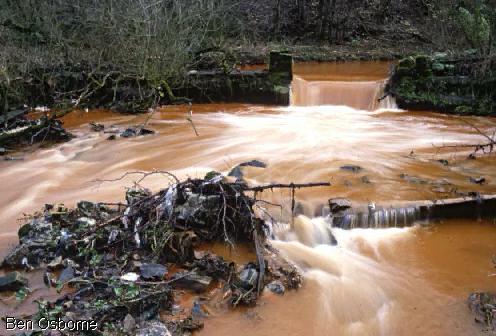Pollution
As Long Point is centrally located on the North shore of Lake Erie,
one has to appreciate the significant role Lake Erie plays as a great ecosystem.
With all the positive and negative influence Lake Erie can place on Long Point Country,
whether it be by air, water or land, pollution is everyone's concern. Therefore education and
awareness is extremely important.

Polluted River
The pollution of rivers and streams with chemical contaminants has become one of the most critical environmental
problems of the century. Chemical pollution entering rivers and streams can be classified according to the nature of its
sources: point pollution and nonpoint pollution. Point pollution involves those pollution sources from which distinct
chemicals can be identified, such as factories, refineries, or outfall pipes. Nonpoint pollution involves pollution from
sources that cannot be precisely identified, such as runoff from agricultural or mining operations or seepage from
septic tanks or sewage drain fields. It is estimated that each year 10 million people die from drinking contaminated
water.
Ben Osborne/Oxford Scientific Films
Polluted River," Microsoft® Encarta® 96 Encyclopedia. © 1993-1995 Microsoft Corporation.
All rights reserved.
Oil Spill Clean-up

Workers use special nets to clean up a California beach following an oil tanker spill. Tanker spills are an increasing
environmental problem because once oil has spilled, it is virtually impossible to completely remove or contain it. Even
small amounts spread rapidly across large areas of water. Because oil and water do not mix, the oil floats on the
water and then washes up on broad expanses of shoreline. Attempts to chemically treat or sink the oil may further
disrupt marine and beach ecosystems.
Spencer Grant/Photo Researchers, Inc.
Oil Spill Clean-up," Microsoft® Encarta® 96 Encyclopedia. © 1993-1995 Microsoft Corporation. All rights reserved.
Toxic Waste in Love Canal

Residents of the Love Canal area in Niagara Falls were forced to evacuate when hazardous wastes leaking from a
former disposal site threatened their health and homes in the late 1970s. One of the most notorious cases of toxic
waste leakage, the crisis received attention on both local and national levels. Investigation spurred by public outrage
revealed that many waste disposal sites like Love Canal existed nationwide. New York alone had several hundred.
Several states have since passed stricter regulations on industrial waste disposal and allocated billions of dollars for
the cleanup of contaminated areas.
Jan Callagan/Phototake NYC
Toxic Waste in Love Canal," Microsoft® Encarta® 96 Encyclopedia. © 1993-1995 Microsoft
Corporation. All rights reserved.
Effluent From an Outfall Pipe

Effluent discharge represents one form of point pollution. Contaminants present in effluent discharge include heavy
metals, mercury, raw sewage, coliform bacteria and various disease-causing protozoans. These contaminants
accumulate in bottom sediments and become incorporated into bottom-dwelling fish and invertebrates. Once
assimilated into living plants and animals, the contaminants move quickly through the food chain, affecting the health
of animals and humans.
Ronald Toms/Oxford Scientific Films
Effluent From an Outfall Pipe," Microsoft® Encarta® 96 Encyclopedia. © 1993-1995 Microsoft
Corporation. All rights reserved.
Pest Control or Pollution?

Pest control has become a difficult issue for farmers because of its potential environmental impact. Although the
insecticide being sprayed on this potato field will eliminate a generation of Colorado potato beetles, it may also
contaminate local food and water sources.
Blair Seitz/Photo Researchers, Inc.
Pest Control or Pollution?," Microsoft® Encarta® 96 Encyclopedia. © 1993-1995 Microsoft
Corporation. All rights reserved.
Smoke Billowing from Industrial Smokestacks

Carbon dioxide, sulfur dioxide, and other types of contaminants pouring from industrial smokestacks contribute largely
to the world’s atmospheric pollution. Carbon dioxide contributes significantly to global warming, while sulfur dioxide
emissions are the principal cause of acid rain in northeastern United States, southeastern Canada, and eastern
Europe.
Kim Westerskov/Oxford Scientific Films
Smoke Billowing from Industrial Smokestacks," Microsoft® Encarta® 96 Encyclopedia. ©
1993-1995 Microsoft Corporation. All rights reserved.
Atmospheric Pollution

Automobile exhaust adversely affects the health of animals and plants and the chemical nature of the atmosphere.
Carbon dioxide and hydrocarbon emissions, two of the major components of automobile exhaust produced in the
combustion of petroleum-based fuels, contribute significantly to global warming. Elevated carbon dioxide and
hydrocarbon levels cause sunlight to be reflected and trapped within the atmosphere, slowly raising the atmospheric
temperature.
Harold Taylor/Oxford Scientific Films
Atmospheric Pollution," Microsoft® Encarta® 96 Encyclopedia. © 1993-1995 Microsoft
Corporation. All rights reserved.
Thermal Inversion

Smog surrounds the Angel Monument in Mexico City, Mexico, during a thermal inversion. Air pollution increases
dramatically as a mass of cold air is trapped below a warmer mass of air. The absence of wind circulation prevents
pollution near the earth’s surface from escaping.
Wesley Bocxe/Photo Researchers, Inc.
Thermal Inversion," Microsoft® Encarta® 96 Encyclopedia. © 1993-1995 Microsoft
Corporation. All rights reserved.
Major Air Pollutants

Sources of major air pollutants include individual actions, such as driving a car, and industrial activities, such as
manufacturing products or generating electricity. Note: 1 cubic meter (1m3) is equal to 35.3 cu ft; 1 milligram (1 mg) is
equal to 0.00004 oz; 1 microgram (1µg) is equal to 0.00000004 oz.
Microsoft Table
Major Air Pollutants," Microsoft® Encarta® 96 Encyclopedia. © 1993-1995 Microsoft
Corporation. All rights reserved
Back To
 17 Miles Long & Kills
17 Miles Long & Kills
Back to Water Use
Back to Agriculture
Design by:
 Pagoda Vista
Pagoda Vista











